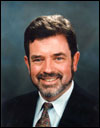December 1, 2003
Dr. Joe O'Neill
Hi, I'm Dr. O'Neill taking your questions on "Ask the White House" from South Africa. I am the Medical Director and a Deputy Director of the Office of the Global AIDS Coordinator at the U.S. Department of State. Let's get started!
Audra, from Fort Fairfield, Maine
writes:
In the countries where AIDS is running rampant, is there no formal
education that these people can receive to try to put a stop or, at least,
slow down the spread of this deadly virus? If these people are being
educated, why is the disease still spreading at the rate in which it is?
Dr. Joe O'Neill
There is a great deal of formal education going on in many of these countries. In Uganda, for example, all schoolchildren have a monthly assembly to learn how to protect themselves from HIV/AIDS. As important as these activities are, it must be understood that education must be constantly reinforced so that behavior changes become permanent.
Lydia, from Olympia, WA writes:
Dr. Joe O'Noeill-
Considering the AIDS crisis, is the United States Governement doing
enough, not only internationally but domestically?
What steps could be taken, if the US was taking this epedimic seriously?
Thanks-
Lydia
Dr. Joe O'Neill
The U.S. Government under President Bush's leadership takes this epidemic very seriously. Over 50 percent of bilateral support for global AIDS comes from the United States. President Bush has asked for record levels of funding for domestic care, prevention and research. We call on all sectors of the United States including local governments, state governments, the private sector and other national governments to join us in fighting this disease.
Ramesh, from Norway writes:
which are the nations in the danger field in terms of epidemic and what steps
is the U.S taking to help provide quality healthcare at low prices to
individuals of underdeveloped nations?
Dr. Joe O'Neill
All countries in the world are affected by HIV/AIDS. Countries in sub-Saharan Africa and the Caribbean are especially impacted. In addition, India, China, countries in Eastern Europe and Latin America have rapidly growing AIDS epidemics. It is for this reason that President Bush has dramatically increased funding for global AIDS and has particularly targeted 14 countries where 50 percent of people infected with HIV live.
Hank, from Bowling Green
writes:
What do you do as Global Aids Coordinator? What are you doing in South Africa
now?
Dr. Joe O'Neill
Ambassador
Randall Tobias was appointed by
President Bush to be the Global AIDS Coordinator. I am the Medical Director and a Deputy Director of the Office of the Global AIDS Coordinator at the U.S. Department of State.
I am in Cape Town, South Africa to open a new hospice to help people living with HIV/AIDS and to work with African nurses, social workers and physicians to adapt the textbook that I edited on clinical care of people living with HIV/AIDS.
Stephanie, from SF Bay Area
writes:
AIDS and drug abuse are major problems around the world. As a violence
prevention specialist for 30 years, I have seen how this self destructive
behavior devastates communities. Prevention must go beyond education as
this is a crisis of the human spirit and a breakdown of community support.
What is being done to improve the human condition?
Dr. Joe O'Neill
President Bush has requested increased funding for substance abuse treatment, an extremely important HIV prevention strategy. We call on all government and non-government leaders to follow President Bush in recognizing the fundamental dignity of each and every man, woman and child as the cornerstone of our fight against AIDS.
Hans, from New Jersey writes:
What is the rest of the world doing to help out with AIDS funding? What global
involvement do you expect in the future?
Dr. Joe O'Neill
The U.S. is currently funding about half of bilateral activities in the fight against global HIV/AIDS. Some other countries are also doing their share and we call on all nations of the world to follow the leadership demonstrated by President Bush in his most recent State of the Union Address that marked an unprecedented commitment in the fight against AIDS.
Roger, from Wisconsin writes:
I'm all for the government spending billions of dollars to educate and
prevent the spread of HIV. However, how can we ensure that this money is
being spent wisely? What SPECIFICALLY will the government do with this
money?
Dr. Joe O'Neill
The President has given his Administration very clear goals in the global HIV/AIDS fight: two million people treated, seven million cases of HIV prevented, and care provided to 10 million individuals by 2008. We will measure ourselves against these goals, closely monitor the use of these funds and strengthen systems of accountability. President Bush, in appointing Ambassador Tobias, selected a business leader of great capability and compassion who will apply his management expertise to make sure that these funds are used in an effective and accountable manner.
Rachel, from Santa Fe
writes:
Is there anything that the average American can do to help with the
world-wide AIDS problem? Is there anything you would suggest? Thanks.
Dr. Joe O'Neill
The average American should educate himself or herself, their family and their community about this terrible problem. It's important that the American public continue to support President Bush in his efforts to lead the world and to encourage others to join this fight. The average American can support non-governmental organizations and churches engaged in this battle with donations of their time, talent and resources. We ask all Americans to keep those affected by, living with, and working on AIDS in their thoughts and prayers.
For more information, please visit www.usaid.gov/pop_health/aids/
and www.omhrc.gov/worldaidsday/.
Dr. Joe O'Neill
On this World AIDS Day, we stop to remember those who have died from AIDS, to pray for those who are living and affected by AIDS, and to commit ourselves to this fight.
Thank you for your questions.






